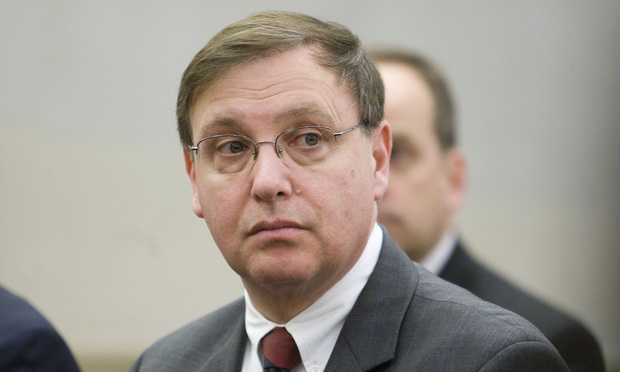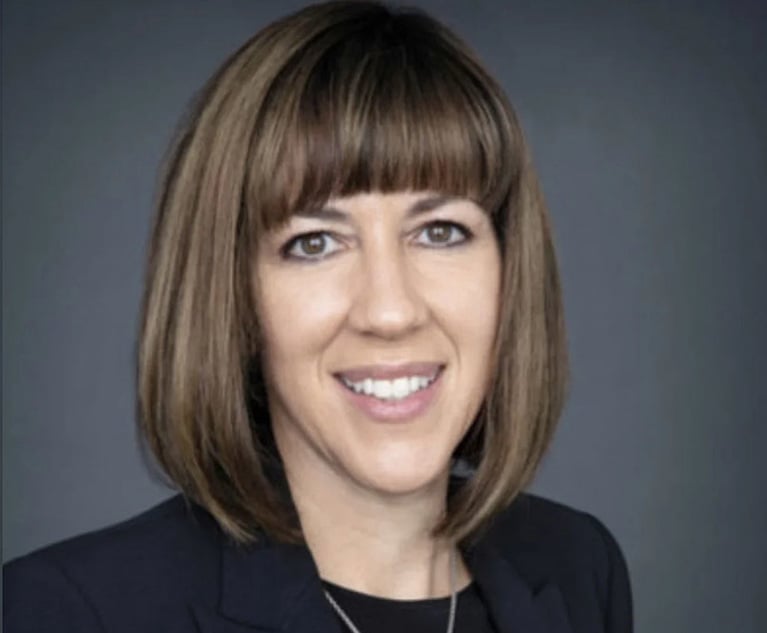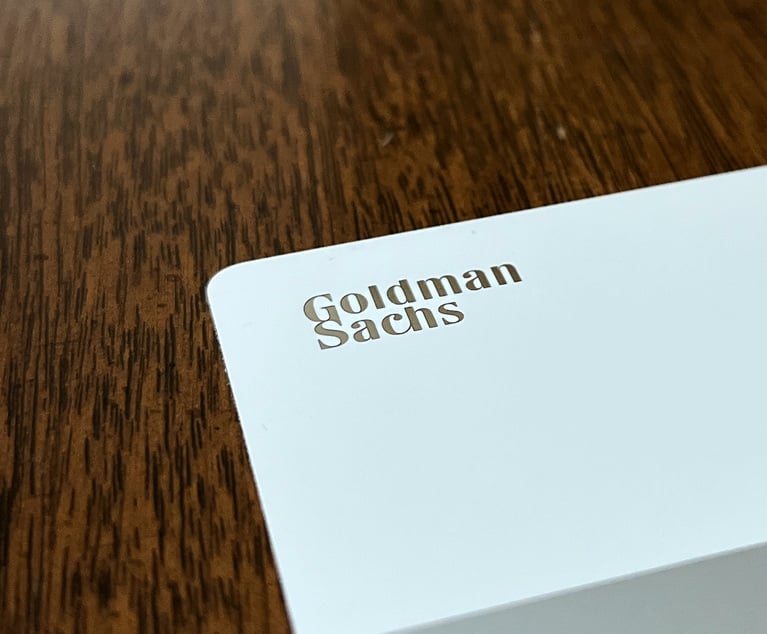'Oath' Podcast Offers 'Introspection' From Top Gov't Lawyers and Officials, Host Chuck Rosenberg Says
Rosenberg, the widely respected former federal public servant, isn't interested in listing his guests' stellar resumes or in confronting some weighty issue crashing today's news, he said in an interview. He wants to get at what made them who they are today, and at how they rose to top-level government positions.
September 30, 2019 at 05:45 PM
6 minute read
 Chuck Rosenberg. Photo: Diego M. Radzinschi/ALM
Chuck Rosenberg. Photo: Diego M. Radzinschi/ALM
When Chuck Rosenberg begins one of his interviews of a high-ranking government lawyer or official for his podcast "The Oath With Chuck Rosenberg," he typically begins by asking where his guest was born, or where they grew up, or about some life-shaping episode from their childhood.
Rosenberg, the widely respected former federal public servant—he held posts in two different presidential administrations ranging from U.S. attorney appointments in Virginia and Texas to counsel to then-FBI director Robert Mueller—is feeling his way into an "exploration of those who have chosen public service as a career," he says.
He's not interested in listing his guest's stellar resume or in confronting some weighty issue crashing today's news. He wants to get at what made his guest who they are today and at how they rose to a top-level government position—or, as he says, "what shaped them, what informed them, what drove them along way."
In a recent interview with the New York Law Journal and ALM about his podcast—now in its second season and bringing in about 200,000 to 300,000 downloads per episode, according to MSNBC, a significant portion of them attorneys and government employees and officials—Rosenberg also said that "The Oath" offers a "crash course on leadership."
These are usually "thoughtful, humble, and talented men and women who have led at the highest levels of government," he said. "And they are usually much more interesting than they are sometimes portrayed on TV" during interviews or news reports about what they've done or decided.
His guests, both last season and this season (though less so this season, he says) are largely people "that I know" or "know of" from decades spent in federal government service and high-level legal circles, Rosenberg said. (He also served as administrator of the Drug Enforcement Agency, chief of staff to then-FBI director James Comey, and counsel to then-Attorney General John Ashcroft, to tick off a few more past positions.)
Early guests in the initial podcast season included Preet Bharara, former U.S. attorney for the Southern District of New York; Comey; and Andrew McCabe, a former deputy director at the FBI.
In this second season—its fourth podcast will be released Wednesday—"we are sort of broadening our horizons," maintained Rosenberg, naming second-season guests including William McRaven, a former Navy admiral and commander of U.S. Special Operations Command; James Stavridis, a retired Navy admiral and former commander of U.S. European Command and NATO Supreme Allied Commander Europe; Robert Paulson, a former commissioner of the Royal Canadian Mounted Police; and Kathy Ruemmler, a former White House Counsel, federal prosecutor and a lead prosecutor in the Enron scandal.
And while he works diligently to unearth life stories and lessons from men and women who spend an hour with Rosenberg for a weekly podcast, he also sometimes does draw out guests about some of their toughest or most significant professional decisions.
Last season, for example, Sally Yates, the former acting U.S. attorney general under President Donald Trump, discussed why she refused to allow DOJ lawyers to argue for the president's original travel ban and why she thought it was more important to defy Trump on the issue—leading to her firing—than just resign.
At one point in the interview, Yates told Rosenberg that "to me, doing something less than" outright refusing to defend the ban—referring to the original Trump administration travel ban issued in January 2017 that applied to seven Muslim-majority countries—such as resigning, "maybe that protects my personal integrity, but it's not protecting the Department of Justice. And as the acting attorney general I believe that that was my responsibility."
McRaven, whose podcast interview has already been released, talked about how to plan and rehearse special operations, Rosenberg said, and described "a moving scene" in which a special message of inspiration was read to the now-famous Navy SEAL Team Six before they flew off in darkness to Abbottabad, Pakistan, to kill Osama bin Laden.
Rosenberg, who is currently a senior counsel in Crowell & Moring's Washington, D.C., office, said that he came up with the idea for "The Oath" after appearing regularly on MSNBC as a commentator on "rule of law" issues. He enjoyed the appearances, he said, but found that they didn't offer "enough time and space to really drill down on some of the personalities and issues" at hand.
The hour-long podcast format, he said, gives him time to talk with guests who can be "remarkably introspective."
"The people who are in the news are multidimensional and have fascinating backgrounds and stories, and I wanted to help tell those," he said.
He added, "I was also looking for a way for more light than heat. A lot of times in our public discourse there isn't interest in long-form stories and thoughtful responses—we end up yelling at each other a lot."
My guests talk about "humility, failure and struggle, about second chances," he said.
He added that he has gotten thousands of emails from "Oath" listeners, including "from a number of judges who say … they're glad that there's a space to explain complicated things in a thoughtful way."
In addition, "I've heard from a number of federal defenders"—for instance, he said, after a recent episode with a prosecutor of 9/11 attacker Zacarias Moussaoui in which the "important work" of the federal public defenders was also praised.
They "appreciated that their work was noted," he explained, adding that the public defenders involved "were another part of the system and were necessary to its fair operation" in the Moussaoui case, in which Moussaoui ultimately pleaded guilty.
Rosenberg also noted one other aim of his podcast. He hopes that younger people considering government-focused public service roles are "inspired" when they hear an "Oath" podcast.
"We need the best and brightest to serve," he said. "I hope they are listening and they sign up. We need the best and brightest."
This content has been archived. It is available through our partners, LexisNexis® and Bloomberg Law.
To view this content, please continue to their sites.
Not a Lexis Subscriber?
Subscribe Now
Not a Bloomberg Law Subscriber?
Subscribe Now
NOT FOR REPRINT
© 2025 ALM Global, LLC, All Rights Reserved. Request academic re-use from www.copyright.com. All other uses, submit a request to [email protected]. For more information visit Asset & Logo Licensing.
You Might Like
View All
'It's a Matter of Life and Death:' Ailing Harvey Weinstein Urges Judge to Move Up Retrial

Spotify GC Steps Down, Opts to 'Step Away From Full-Time Corporate Life'
2 minute read
Goldman Sachs Secures Dismissal of Celebrity Manager's Lawsuit Over Failed Deal
3 minute read
Walt Disney, IBM Denied High Court Review of Old NY Franchise Tax Law
3 minute readTrending Stories
- 1Perkins Coie Hires Anthony Shannon as Chief People Officer
- 2Who Is Nicholas J. Ganjei? His Rise to Top Lawyer
- 3Delaware Supreme Court Names Civil Litigator to Serve as New Chief Disciplinary Counsel
- 4Inside Track: Why Relentless Self-Promoters Need Not Apply for GC Posts
- 5Fresh lawsuit hits Oregon city at the heart of Supreme Court ruling on homeless encampments
Who Got The Work
J. Brugh Lower of Gibbons has entered an appearance for industrial equipment supplier Devco Corporation in a pending trademark infringement lawsuit. The suit, accusing the defendant of selling knock-off Graco products, was filed Dec. 18 in New Jersey District Court by Rivkin Radler on behalf of Graco Inc. and Graco Minnesota. The case, assigned to U.S. District Judge Zahid N. Quraishi, is 3:24-cv-11294, Graco Inc. et al v. Devco Corporation.
Who Got The Work
Rebecca Maller-Stein and Kent A. Yalowitz of Arnold & Porter Kaye Scholer have entered their appearances for Hanaco Venture Capital and its executives, Lior Prosor and David Frankel, in a pending securities lawsuit. The action, filed on Dec. 24 in New York Southern District Court by Zell, Aron & Co. on behalf of Goldeneye Advisors, accuses the defendants of negligently and fraudulently managing the plaintiff's $1 million investment. The case, assigned to U.S. District Judge Vernon S. Broderick, is 1:24-cv-09918, Goldeneye Advisors, LLC v. Hanaco Venture Capital, Ltd. et al.
Who Got The Work
Attorneys from A&O Shearman has stepped in as defense counsel for Toronto-Dominion Bank and other defendants in a pending securities class action. The suit, filed Dec. 11 in New York Southern District Court by Bleichmar Fonti & Auld, accuses the defendants of concealing the bank's 'pervasive' deficiencies in regards to its compliance with the Bank Secrecy Act and the quality of its anti-money laundering controls. The case, assigned to U.S. District Judge Arun Subramanian, is 1:24-cv-09445, Gonzalez v. The Toronto-Dominion Bank et al.
Who Got The Work
Crown Castle International, a Pennsylvania company providing shared communications infrastructure, has turned to Luke D. Wolf of Gordon Rees Scully Mansukhani to fend off a pending breach-of-contract lawsuit. The court action, filed Nov. 25 in Michigan Eastern District Court by Hooper Hathaway PC on behalf of The Town Residences LLC, accuses Crown Castle of failing to transfer approximately $30,000 in utility payments from T-Mobile in breach of a roof-top lease and assignment agreement. The case, assigned to U.S. District Judge Susan K. Declercq, is 2:24-cv-13131, The Town Residences LLC v. T-Mobile US, Inc. et al.
Who Got The Work
Wilfred P. Coronato and Daniel M. Schwartz of McCarter & English have stepped in as defense counsel to Electrolux Home Products Inc. in a pending product liability lawsuit. The court action, filed Nov. 26 in New York Eastern District Court by Poulos Lopiccolo PC and Nagel Rice LLP on behalf of David Stern, alleges that the defendant's refrigerators’ drawers and shelving repeatedly break and fall apart within months after purchase. The case, assigned to U.S. District Judge Joan M. Azrack, is 2:24-cv-08204, Stern v. Electrolux Home Products, Inc.
Featured Firms
Law Offices of Gary Martin Hays & Associates, P.C.
(470) 294-1674
Law Offices of Mark E. Salomone
(857) 444-6468
Smith & Hassler
(713) 739-1250






